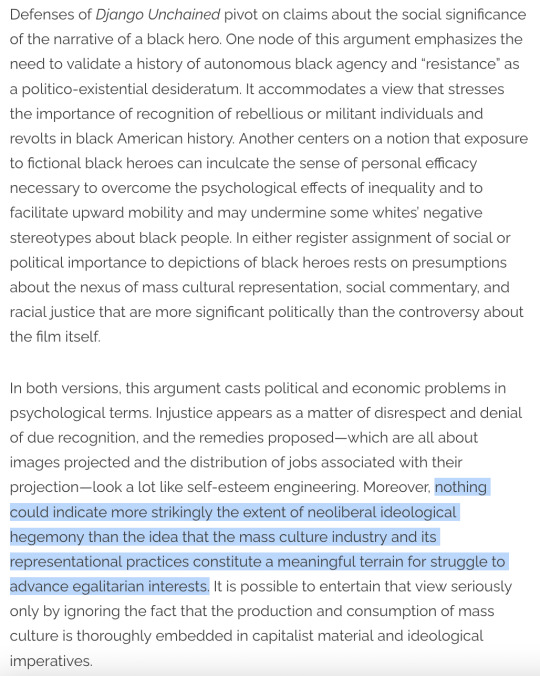#manumitting
Text
Manumit
Verb
Definition: release from slavery; set free
Ex. Upon his death, George Washington manumitted his slaves.
View On WordPress
2 notes
·
View notes
Text
By/For/Of The People - Barbados, a Homogeneous Society - Why don’t the BLP and the DLP support each other post elections?
youtube
https://youtu.be/rFEe-XSlOaQ
There’s a bitchiness present that looks unbecoming on The People given elected offices (past/present/potential). As a manumit people, you should compliment each other for the good of the/your country.
Where is Chris Sinckler? Have your say. Naked!!
Like/share/comment/subscribe on YouTube (it costs you nothing). Press the notification bell 🔔. NEW WhatsApp #2527225512
0 notes
Text
Asian slaves, indigenous Americans, and identity in colonial era Mexico
The Spanish Philippines had a diverse slave population for local labor and export, including Filipino Indians [i.e. natives; indios], Muslim war captives (moros), and foreign slaves from as far away as Portuguese India.
… Upon their arrival, chino slaves [i.e. any Asian slave, not just Chinese] were absorbed by the urban economy of Mexico City, where they mainly worked as domestic servants or in textile mills (obrajes) … For their part, working in the city provided chinos with some possibilities for manumission. Chinos in domestic service were especially apt to embrace the limited opportunities available to them and to experience some social mobility. In the obrajes, chinos had few of the freedoms given to domestic servants, but they did benefit from government oversight of the industry. During official visits, chino slaves appealed for protection from overt exploitation by claiming that they were Indians (even if they were from Portuguese India). Remarkably, visiting inspectors listened to their complaints, and they often responded by liberating individual chinos under the assumption that they were indeed native vassals and could thus not be held in bondage. The overall experience of chinos in the viceroyal capital confirms the benefits of living close to the center of colonial power.
The presence of free indigenous immigrants from the Spanish Philippines in Mexico reinforced the idea that all chinos were Indians. The complex governing structure of colonial Mexico involved two republics or political communities (the república de indios and the república de españoles); this organization separated the indigenous majority from everyone else to facilitate the collection of tribute and the ministry of the Catholic Church … [N]ative immigrants from the Philippines purposely sought to confirm their membership in the Republic because corporate status provided personal advantages. They asked to be tallied in tribute rolls in Mexico to benefit from concomitant privileges, such as trading rights and legal representation through the General Indian Court. At the same time, free Filipinos were frequently confused with chino slaves - a situation that had serious consequences for Filipinos' relations with colonial institutions and enslaved individuals. Some immigrants resented having their indigenous identity questioned and sought to maintain a sense of their Indian-ness by keeping their distance from chino slaves. The majority, however, expressed solidarity with chino slaves. Filipino artisans, for example, took on chino slaves as apprentices and taught them marketable skills. Similarly, Filipino traders incorporated chinos into their own credit networks to facilitate self-purchase.
Individual chinos who were manumitted also embraced an Indian identity, regardless of whether they were from Goa, Macau, or other places in South and Southeast Asia. In this way, chinos challenged official attempts to define them solely as former slaves. Instead, they sought to join the free republic. The possibility for this kind of social integration caused widespread concern among slave owners. To defend their property rights, masters started to brand chino slaves on the face, rather than on the chest or arm as they did with Africans, in order to dissuade them from fleeing and "passing" as free Indians. This horrifying development shows that Indian communities welcomed runaway chino slaves and, by extension, that slave owners sought visible markers of their slaves' status.
Excerpt from the Introduction to “Asian Slaves in Colonial Mexico: From Chinos to Indians” (2014) by Tatiana Seijas
114 notes
·
View notes
Text

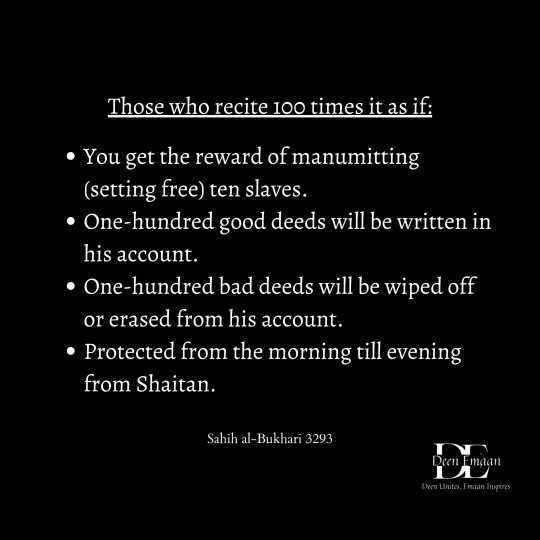
Narrated Abu Huraira:
Allah's Messenger (ﷺ) said, "If one says one-hundred times in one day: "None has the right to be worshipped but Allah, the Alone Who has no partners, to Him belongs Dominion and to Him belong all the Praises, and He has power over all things (i.e. Omnipotent)", one will get the reward of manumitting ten slaves, and one-hundred good deeds will be written in his account, and one-hundred bad deeds will be wiped off or erased from his account, and on that day he will be protected from the morning till evening from Satan, and nobody will be superior to him except one who has done more than that which he has done."
Sahih al-Bukhari 3293
#hadith#prophetmuhammadﷺ#allahﷻ#muslim#allahuakbar#believeinallah#allah#allahplans#quran#islam#quranverses#muhammadﷺ#islamdaily#islamicreminders#islamicquotes#islamic#islam4 life#islamicpost#islampost
118 notes
·
View notes
Text

عن أبي هريرة رضى الله عنه، أن رسول الله صلى الله عليه وسلم قال: “ من قال لا إله إلا الله، وحده لا شريك له، له الملك وله الحمد، وهو على كل شىء قدير. في يوم مائة مرة، كانت له عدل عشر رقاب، وكتب له مائة حسنة، ومحيت عنه مائة سيئة، وكانت له حرزا من الشيطان يومه ذلك، حتى يمسي، ولم يأت أحد بأفضل مما جاء به إلا رجل عمل أكثر منه ". صحيح البخاري حديث ٦٤٠٣ - صحيح مسلم حديث ٢٦٩١
Narrated Abu Huraira: Allah’s Messenger (peace be upon him) said,” Whoever says: “La ilaha illal-lah wahdahu la sharika lahu, lahu-l-mulk wa lahul- hamd wa huwa ‘ala kulli shai'in qadir,” one hundred times will get the same reward as given for manumitting ten slaves; and one hundred good deeds will be written in his accounts, and one hundred sins will be deducted from his accounts, and it (his saying) will be a shield for him from Satan on that day till night, and nobody will be able to do a better deed except the one who does more than he.“ Sahih al-Bukhari 6403 In-book reference : Book 80, Hadith 98 USC-MSA web (English) reference : Vol. 8, Book 75, Hadith 412
Sahih Muslim 2691 In-book reference : Book 48, Hadith 38 USC-MSA web (English) reference : Book 35, Hadith 6508
قال النووي رحمه الله :
"وَظَاهِرُ إِطْلَاقِ الْحَدِيثِ أَنَّهُ يُحَصِّلُ هَذَا الْأَجْرَ الْمَذْكُورَ فِي هَذَا الْحَدِيثِ مَنْ قَالَ هَذَا التَّهْلِيلَ مِائَةَ مَرَّةٍ فِي يَوْمِهِ سَوَاءٌ قَالَهُ مُتَوَالِيَةً ، أَوْ مُتَفَرِّقَةً فِي مَجَالِسَ ، أَوْ بَعْضَهَا أَوَّلَ النَّهَارِ وَبَعْضَهَا آخِرَهُ .
لَكِنَّ الْأَفْضَلَ : أَنْ يَأْتِيَ بِهَا مُتَوَالِيَةً ، فِي ��َوَّلِ النَّهَارِ ؛ لِيَكُونَ حِرْزًا لَهُ فِي جَمِيعِ نَهَارِهِ" انتهى من "شرح النووي على مسلم" (17/17) .
وقال ابن رجب رحمه الله :
" تحقيق كلمة التوحيد يوجب عتق الرقاب ، وعتق الرقاب يوجب العتق من النار ، كما ثبت في الصحيح: أن من قالها مائة مرة كان له عدل عشر رقاب .
وثبت أيضا: أن من قالها عشر مرات كان كمن اعتق أربعة من ولد إسماعيل . الاسلام سؤال وجواب ()
فتَحَ اللهُ سُبحانَه لعِبادِه كَثيرًا مِن أبوابِ الخيرِ؛ مِن الذِّكرِ والدُّعاءِ والتَّهليلِ والتَّسبيحِ، وأعْطاهُم على ذلك الفضلَ العظيمَ والثَّوابَ الكبيرَ.
وفي هذا الحديثِ يُخبِرُ النَّبيُّ صلَّى اللهُ عليه وسلَّمَ عن فَضْلِ الذِّكرِ بكَلمةِ التَّوحيدِ، وأنَّ مَن قال: «لا إلهَ إلَّا اللهُ وحْدَه لا شَريكَ لَه، لَه المُلكُ» فهو سُبحانَه المُختَصُّ بالسُّلطانِ التَّامِّ الَّذي لا يُنازِعُه فيه مُنازِعٌ، «ولَهُ الحَمدُ» فهو المُستحِقُّ له دونَ مَن سِواهُ سُبحانَه، «وهو على كُلِّ شَيءٍ قَديرٌ» فلا يُعجِزُه شَيءٌ في الأرضِ ولا في السَّماءِ؛ فمَن قال ذلك في يومٍ مِئةَ مرَّةٍ، كانت له مِثلُ ثَوابِ عِتْقِ عَشَرةٍ مِنَ العَبيدِ المَملوكين، وكُتِبتْ له مِئةُ حَسنةٍ، ومُحِيَت عنه مِئةُ سَيِّئةٍ، وكان هذا الذِّكرُ تَحصينًا له مِنَ الشَّيطانِ طَوالَ يَومِه إلى المَساءِ، ولا يَكونُ أحدٌ أفْضَلَ عمَلًا مِنَ الَّذي قال هذا الذِّكْرَ، إلَّا مَن قال هذا الذِّكرَ أزيدَ مِن مِئةِ مرَّةٍ، ويَحتمِلُ أنْ تُرادَ الزِّيادةُ مِن غيرِ هذا الجنسِ مِن الذِّكرِ وغيرِه، أي: إلَّا أنْ يَزيدَ أحدٌ عمَلًا آخَرَ مِن الأعمالِ الصَّالحةِ. الدرر السنية ()
An-Nawawi (may Allah have mercy on him) said:
The general meaning of the hadith indicates that the reward mentioned may be attained by the one who repeats this dhikr one hundred times in a day, whether he repeats it consecutively or at different times in several sessions, or he recites some of it at the beginning of the day and some at the end of the day. But the best is to recite it consecutively at the beginning of the day, so that it will be a protection for him throughout his day." (Sharh an-Nawawi ‘ala Muslim 17/17). Islam Q&A: these languages are available also: Indonesian Uyghur French Turkish اردو Portuguese German
#حديث#أحاديث نبوية#اللهم صل وسلم على نبينا محمد#لا إله إلا الله#حديث الرسول#صلى الله عليه وسلم#hadith#رسول الله صلى الله عليه وسلم#محمد صلى الله عليه وسلم#الرسول صلى الله عليه وسلم#النبي صلى الله عليه وسلم#sunnah#islam#ahadeth#muslim#hadeth#hadith sahih#لا إله إلا الله وحده لا شريك له له الملك وله الحمد وهو على كل شيء قدير#حرز#عشر رقاب#ذكر#أذكار#حسنات#عشر ذي الحجة#وليال عشر#prophet muhammad#athkar#shield#dhulhijjah#hadiths
36 notes
·
View notes
Text
Allāh's Messenger (ﷺ) said," Whoever says:
لاَ إِلَهَ إِلاَّ اللَّهُ، وَحْدَهُ لاَ شَرِيكَ لَهُ، لَهُ الْمُلْكُ وَلَهُ الْحَمْدُ،
وَهْوَ عَلَى كُلِّ شَىْءٍ قَدِيرٌ
(None has the right to be worshipped but Allāh, Alone, without partner, to Him belongs all that exists, and to Him belongs the Praise, and He is powerful over all things.)
one hundred times will get the same reward as given for
1: manumitting ten slaves; and
2: one hundred good deeds will be written in his accounts, and
3: one hundred sins will be deducted from his accounts, and
4: it (his saying) will be a shield for him from Satan on that day till night,
and nobody will be able to do a better deed except the one who does more than he."
[Sahih al-Bukhari 6403]
185 notes
·
View notes
Text
Someone asked me to write up a bit more of what Anne Rice was thinking making Marius a verna (a type of slave in Rome, a status from which we can infer he was manumitted). I've uploaded that here (intro excerpt below):
Marius in TVC: Implications of References to Roman Society
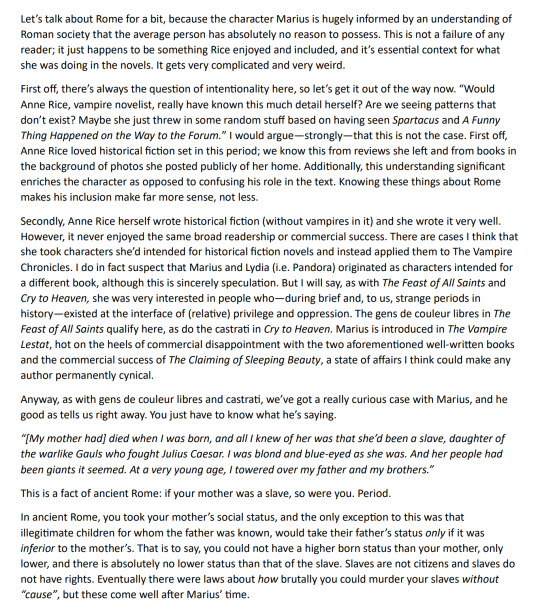
continue reading here.
Minimally, you'll come away having learned something about vernae and about the process of manumission (freedom from slavery in the Roman system, heavily implied to have occurred). I'm not an expert on the Servile Wars or manumission or what-have-you so there are a lot of direct citations in the link.
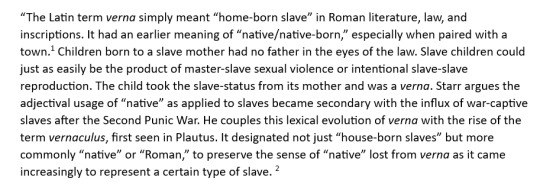
(- Dr. R. Conn)
#tvc#marius de romanus#tvc meta#reblog and I will spiritually buy you a hat#like on the astral plane
112 notes
·
View notes
Text
THE GRAND FINALE
WHO IS THE TRULY THE WORST FOUNDING FATHER?
THOMAS JEFFERSON VS HENRY LAURENS
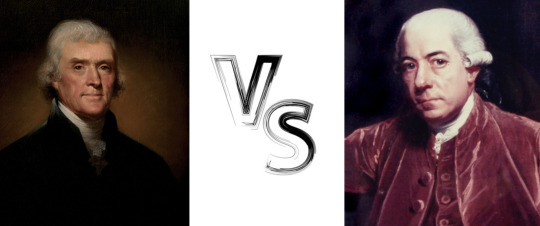
Thomas Jefferson (April 13, 1743 – July 4, 1826) was an American statesman, diplomat, lawyer, architect, and philosopher who served as the third president of the United States from 1801 to 1809. Following the American Revolutionary War and prior to becoming the nation’s third president in 1801, Jefferson was the first United States secretary of state under George Washington and the nation’s second vice president under John Adams.
Starting in 1803, he promoted a western expansionist policy with the Louisiana Purchase and began the process of Indian tribal removal from the newly acquired territory.
Jefferson lived in a planter economy largely dependent upon slavery, and used slave labor for his household, plantation, and workshops. Over his lifetime he owned about 600 slaves.
During his presidency, Jefferson allowed the diffusion of slavery into the Louisiana Territory hoping to prevent slave uprisings in Virginia and to prevent South Carolina secession. In 1804, in a compromise on the slavery issue, Jefferson and Congress banned domestic slave trafficking for one year into the Louisiana Territory.
In 1819, Jefferson strongly opposed a Missouri statehood application amendment that banned domestic slave importation and freed slaves at the age of 25 on grounds it would destroy the union.
Jefferson never freed most of his slaves, and he remained silent on the issue while he was president.
Since the 1790s, Jefferson was rumored to have had children by his sister-in-law and slave Sally Hemings, known as the Jefferson-Hemings controversy. According to scholarly consensus…as well as oral history, Jefferson probably fathered at least six children with Hemings.
---
Henry Laurens (March 6, 1724 [O.S. February 24, 1723] – December 8, 1792) was an American Founding Father, merchant, slave trader, and rice planter from South Carolina who became a political leader during the Revolutionary War. A delegate to the Second Continental Congress, Laurens succeeded John Hancock as its president. He was a signatory to the Articles of Confederation and, as president, presided over its passage.
Laurens had earned great wealth as a partner in the largest slave-trading house in North America, Austin and Laurens. In the 1750s alone, this Charleston firm oversaw the sale of more than 8,000 enslaved Africans.
Laurens’ oldest son, Colonel John Laurens, was killed in 1782 in the Battle of the Combahee River, as one of the last casualties of the Revolutionary War. He had supported enlisting and freeing slaves for the war effort and suggested to his father that he begin with the 40 he stood to inherit. He had urged his father to free the family’s slaves, but although conflicted, Henry Laurens never manumitted his 260 slaves.
---
By popular vote, this final round will run for one full week
Please reblog so we can get the biggest sample size possible and figure who is TRULY the worst
#founding father bracket#worst founding father#founding fathers#amrev#brackets#polls#thomas jefferson#henry laurens#FINAL ROUND#the fact that i have books about both of these men on my bookshelves 💀
138 notes
·
View notes
Text

The Trophy's
When their boss/husband was arrested for debt his secretary and trophy wife found themselves in deep trouble when he decided to sell them into slavery to recoup the money and escape the kingdom. At first they expected hell but their new owner is not an unkind Master and the Maid work to which they are assigned is not completely horrible and even their new modest uniforms could be much worse.
Even better while he certainly isn't going to manumit two useful workers he was disgusted to learn how they ended up in the collar, and their former "employer" has found himself kidnapped and shipped off as a slave laborer in the mines.
So yeah things could be much worse for them...
(AI art made with Stable Diffusion)
19 notes
·
View notes
Text
Allah's Messenger (ﷺ) said," Whoever says:
لاَ إِلَهَ إِلاَّ اللَّهُ، وَحْدَهُ لاَ شَرِيكَ لَهُ، لَهُ الْمُلْكُ وَلَهُ الْحَمْدُ، وَهْوَ عَلَى كُلِّ شَىْءٍ قَدِيرٌ
(None has the right to be worshipped but Allah, Alone, without partner, to Him belongs all that exists, and to Him belongs the Praise, and He is powerful over all things.)
one hundred times will get the same reward as given for
1: manumitting ten slaves; and
2: one hundred good deeds will be written in his accounts, and
3: one hundred sins will be deducted from his accounts, and
4: it (his saying) will be a shield for him from Satan on that day till night,
and nobody will be able to do a better deed except the one who does more than he."
[Sahih al-Bukhari 6403]
14 notes
·
View notes
Text
Narrated Hakim bin Hizam:
That he said, "O Allah's Messenger (ﷺ)! What do you think about my good deeds which I used to do during the period of ignorance (before embracing Islam) like keeping good relations with my Kith and kin, manumitting of slaves and giving alms etc; Shall I receive the reward for that?" Allah's Messenger (ﷺ) said, "You have embraced Islam with all those good deeds which you did. It is also said: Abul Yaman has reported ''Atahannathu''. Mamar, Sualih and Ibn-e-Musafir said: Atahannothu.'' Ibn-e-Ishaq says that ''Atahannathu'' means to do good deeds. Similarly, Hisham has reported from his father.
Narrated by Sahih Bukhari in his bookImam Bukhari
Hadith (Sahih)
#quotes#أدعية#أذكار#muslim#arabic quotes#arabic#islam#صدقة جارية#allah#صلوا على النبي محمدﷺ#صلوا على الحبيب محمد ﷺ#صلوا على النبي#صلوات#prophet mohammed#صلى الله عليه وسلم#صلى الله على سيدنا محمدﷺ❤#ادب#تمبلريات#نصوص ادبية#free palestine#gaza#palestine#تمبلر بالعربي#فلسطین#المسجد الأقصى#غزة العزة#israel#sahih-bukhari#Imam Bukhari#Sahih Bukhari
5 notes
·
View notes
Note
I dont think many boys would've had a nurturing relationship with his father in those days, especially rich families like they were raised to be heirs and providers. fathers were barely there to raise kids and even wealthy women left that to the nannies/maids. so i take it louis was favored because he was smart and could be trusted to take over the business. obviously this is just spec cause theres so little on papa du lac but usually when i hear a patriach lost a huge fortune in a fictional context i think the implication is he was too soft/weak, which again would compound louis's desire to be seen as strong and why he could put aside his guilt about his businesses.
papa du lac couldve also been blowing the bag & hoeing around, it couldve been racial tensions in the gilded age following the end of slavery, and the gradual dissolution of the 'free black' caste in legal stature as louisiana becomes more enmeshed+est. in the states/the concept of 'america'... the fact that like a near zero [something like 1.3%?] of black ppl in the states owned slaves + many of them were manumitting their own relatives at that.. ur grandmother's rapist 'liberating' u, the fuckery that puts u in the place to buy your own family's humanity back, to put them to the same work they were forced into, the fact that louis even alludes to the rape [men 'not of my color' or something he tell dan] required to create the caste of creole he was born under, the fact that louis spins back around the block and is pimping his 'sisters' [in the abstract sense of racial consciousness here] ...i dont think louis could ever truly put aside the guilt he felt as a pimp for these reasons and jacob anderson even says louis is more tormented by his occupation in this show. i dont think papa du lac was nurturing to louis by any means, rather in closeness i suggest papa knowing louis is his only heir. the patriarch desires very little more than to self-perpetuate thru its creations. and not directly of course, bc hed never do woman's work.. like a few distant female relatives of theirs born into slavery or first gen removed responsible for rearing louis, grace + paul directly... while florence is the lady[tm] of the house. @firegiftlouis made a great addition on how louis also resembles florence in appearance, aesthetic tastes + how they both try to 'keep the peace' in their families too
55 notes
·
View notes
Text
Daniil keeps changing his rackets, I start to think that there is a conspiracy and that maybe Jack Draper has manumited them to make his boyfriend win.
6 notes
·
View notes
Text
Allāh's Messenger (ﷺ) said," Whoever says:
لاَ إِلَهَ إِلاَّ اللَّهُ، وَحْدَهُ لاَ شَرِيكَ لَهُ، لَهُ الْمُلْكُ وَلَهُ الْحَمْدُ، وَهْوَ عَلَى كُلِّ شَىْءٍ قَدِيرٌ
(None has the right to be worshipped but Allāh, Alone, without partner, to Him belongs all that exists, and to Him belongs the Praise, and He is powerful over all things.)
one hundred times will get the same reward as given for
1: manumitting ten slaves; and
2: one hundred good deeds will be written in his accounts, and
3: one hundred sins will be deducted from his accounts, and
4: it (his saying) will be a shield for him from Satan on that day till night,
and nobody will be able to do a better deed except the one who does more than he."
[Sahih al-Bukhari 6403]
12 notes
·
View notes
Text

Peter Hill (July 19, 1767 - December 1820) was born in Burlington Township, New Jersey. He is assumed to be the son of an enslaved owned by a clockmaker named Joseph Hollinshead, Jr. He grew up in the Hollinshead household and as he grew older was allowed to learn clock-making from his master to assist Hollinshead in his store. In 1794, Hollinshead manumitted him who was 27. His freedom was certified the following year in an official court document.
He married Tina Lewis (1795). She was known in New Jersey for her writing skills and her efforts to provide free schooling for African Americans in the community through the Society of Friends (Quakers).
In 1795 he began making clocks and watches in a shop attached to his home. As he became more successful, he expanded his estate to include cattle, horses, and several acres of land. In 1814, he moved his clock-making business to Mount Holly partly to be near the Quaker farming community which included a paper mill and an ironworks.
Two of his clocks survived the era. The first is a clock made for his neighbor, Rowland Jones, in 1812 which is now located in Westtown School in Westtown, Pennsylvania. The second is a tall case clock which is now held in the National Museum of History and Technology of the Smithsonian Institute.
On February 20, 1820, he bought a brick dwelling house and a lot of land in Mount Holly. #africanhistory365 #africanexcellence
2 notes
·
View notes
